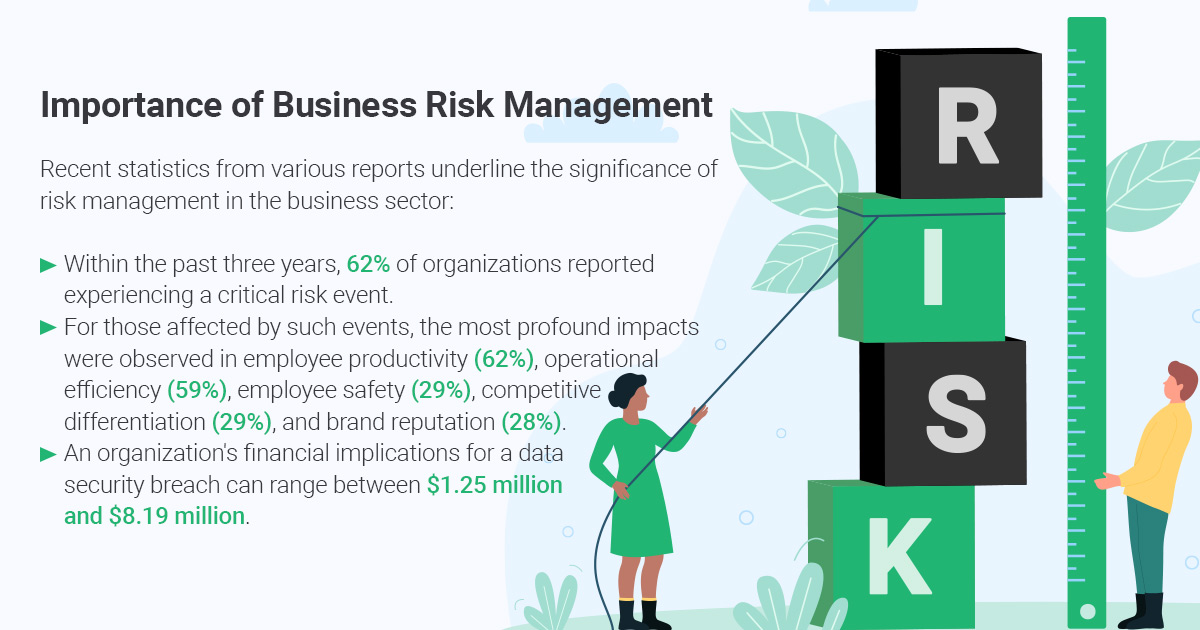The Long-Term Importance of Risk Management in Building Competitive Advantage
The Long-Term Importance of Risk Management in Building Competitive Advantage
Blog Article
The Essential Value of Risk Management in Getting Organizational Objectives
In the quickly evolving business landscape, the ability to browse uncertainty has actually become an imperative. This is where Risk Management actions in, supplying an organized technique to recognizing, analyzing, and mitigating potential roadblocks to advance. It's greater than simply a safety measure - it's a tactical device, fostering durability and technology. As we check out the critical role of Risk Management in accomplishing organizational objectives, one can't aid however question: how does this equate into real-world success?
Comprehending the Idea of Risk Management in Company

The Important Role of Risk Management in Strategic Preparation
Incorporating Risk Management right into critical preparation acts as a guard for organizations, securing their long-lasting strategies with a solid foundation of preparedness and resilience. Risk Management offers a structure for expecting uncertainties and designing suitable responses, ensuring the organization's survival and success also in the face of hardship. By integrating Risk Management into strategic planning, organizations can transform these uncertainties into opportunities for growth and development.

Methods for Identifying, Assessing, and Prioritizing Dangers
Browsing the facility landscape of dangers requires the application of details methods for their analysis, recognition, and prioritization. The process starts with Risk recognition, utilizing devices such as SWOT analysis, which helps in determining possible hazards and possibilities. Next off, Risk assessment is performed to identify the prospective influence and likelihood of each Risk. Devices such as Risk matrices and impact-probability graphes are made use of for this. Risks are focused on based on their possible effect and possibility, permitting organizations to concentrate their sources on high-priority threats. This organized method ensures a comprehensive understanding of the Risk landscape, making it possible have a peek at this website for organizations to make educated choices and successfully take care of threats to attain their objectives - importance of risk management.
Guarding Organizational Operations Via Effective Risk Management
In business landscape fraught with unpredictabilities, efficient Risk Management plays an essential duty in safeguarding business operations. It works as a safety shield, alleviating the negative impacts of possible dangers and making certain the smooth performance of all processes. By identifying and analyzing possible dangers, Risk Management makes it possible for companies to establish robust backup strategies. This preventive approach help in preserving operational security, even when confronted with unanticipated circumstances. Essentially, Risk Management is the lifeline that keeps the business procedures afloat in the middle of turbulent waters. It makes certain not just the survival but the lasting growth of an organization, making it a crucial device in achieving organization purposes. Companies should invest in comprehensive Risk Management strategies to guard their procedures.

Converting Possible Threats to Opportunities: The Power of Risk Management
An aggressive method to take the chance of Management entails identifying, assessing, and focusing on threats to design approaches that transform them right into prospective benefits. Therefore, by leveraging the power of Risk Management, companies can not only protect their operations however also spur development and attain their goals in an uncertain business atmosphere.
Instance Researches: Success Stories of Risk Management Driving Service Objectives
Effective execution of Risk Management approaches has actually generated outstanding outcomes in numerous organizations, underscoring the values of this More Info strategy. International firms like Microsoft and Google, for instance, have actually leveraged Risk Management to reduce threats and make use of possibilities, driving their service objectives onward. These examples highlight how successful Risk Management can not only guide businesses clear of prospective pitfalls however likewise lead them towards their tactical purposes.
Final thought
In conclusion, Risk Management is basically essential in accomplishing organizational goals. By incorporating Risk Management right into critical preparation, services can much better navigate uncertainties, safeguard procedures, and capitalise on possibilities, therefore straightening with lasting goals.
At its core, Risk Management is the procedure of recognizing, analyzing, and resolving possible threats that can adversely affect an organization's objectives or procedures. Next off, Risk evaluation is conducted to determine the potential impact and likelihood of each Risk. Risks look at this now are focused on based on their potential impact and possibility, allowing organizations to focus their resources on high-priority threats. By recognizing and examining prospective threats, Risk Management allows organizations to establish durable contingency strategies. An aggressive strategy to risk Management includes identifying, examining, and prioritizing risks to create techniques that turn them right into potential benefits.
Report this page